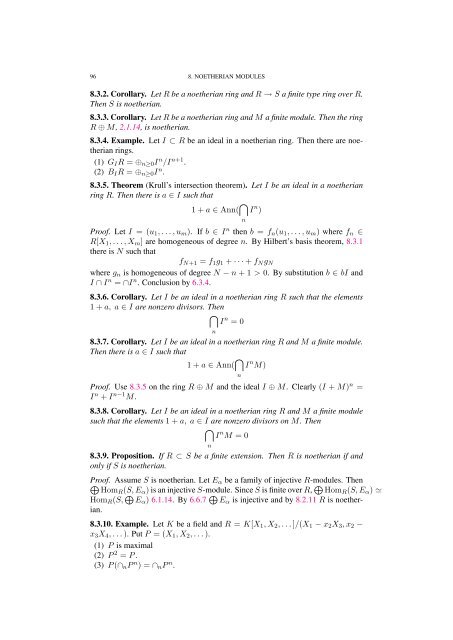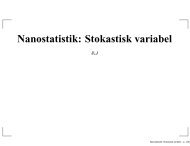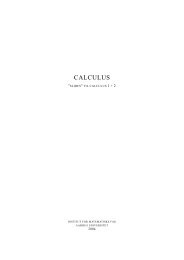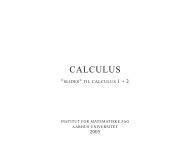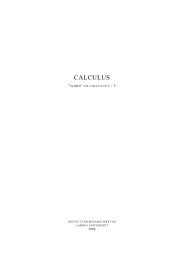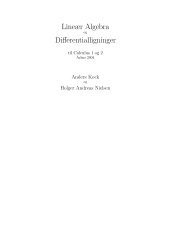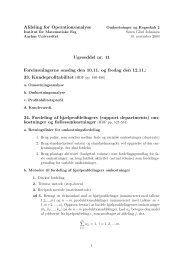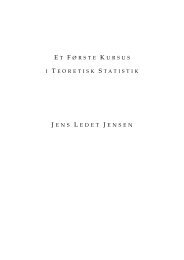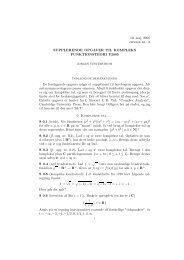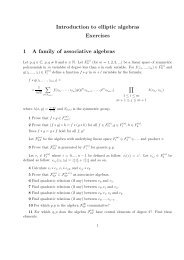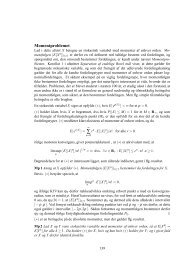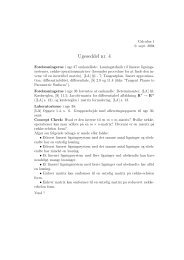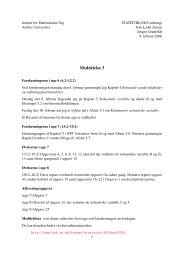Commutative algebra - Department of Mathematical Sciences - old ...
Commutative algebra - Department of Mathematical Sciences - old ...
Commutative algebra - Department of Mathematical Sciences - old ...
You also want an ePaper? Increase the reach of your titles
YUMPU automatically turns print PDFs into web optimized ePapers that Google loves.
96 8. NOETHERIAN MODULES<br />
8.3.2. Corollary. Let R be a noetherian ring and R → S a finite type ring over R.<br />
Then S is noetherian.<br />
8.3.3. Corollary. Let R be a noetherian ring and M a finite module. Then the ring<br />
R ⊕ M, 2.1.14, is noetherian.<br />
8.3.4. Example. Let I ⊂ R be an ideal in a noetherian ring. Then there are noetherian<br />
rings.<br />
(1) GIR = ⊕n≥0I n /I n+1 .<br />
(2) BIR = ⊕n≥0I n .<br />
8.3.5. Theorem (Krull’s intersection theorem). Let I be an ideal in a noetherian<br />
ring R. Then there is a ∈ I such that<br />
1 + a ∈ Ann( <br />
I n )<br />
Pro<strong>of</strong>. Let I = (u1, . . . , um). If b ∈ I n then b = fn(u1, . . . , um) where fn ∈<br />
R[X1, . . . , Xm] are homogeneous <strong>of</strong> degree n. By Hilbert’s basis theorem, 8.3.1<br />
there is N such that<br />
fN+1 = f1g1 + · · · + fNgN<br />
where gn is homogeneous <strong>of</strong> degree N − n + 1 > 0. By substitution b ∈ bI and<br />
I ∩ I n = ∩I n . Conclusion by 6.3.4.<br />
8.3.6. Corollary. Let I be an ideal in a noetherian ring R such that the elements<br />
1 + a, a ∈ I are nonzero divisors. Then<br />
<br />
I n = 0<br />
n<br />
8.3.7. Corollary. Let I be an ideal in a noetherian ring R and M a finite module.<br />
Then there is a ∈ I such that<br />
1 + a ∈ Ann( <br />
I n M)<br />
Pro<strong>of</strong>. Use 8.3.5 on the ring R ⊕ M and the ideal I ⊕ M. Clearly (I + M) n =<br />
I n + I n−1 M.<br />
8.3.8. Corollary. Let I be an ideal in a noetherian ring R and M a finite module<br />
such that the elements 1 + a, a ∈ I are nonzero divisors on M. Then<br />
<br />
I n M = 0<br />
n<br />
8.3.9. Proposition. If R ⊂ S be a finite extension. Then R is noetherian if and<br />
only if S is noetherian.<br />
Pro<strong>of</strong>. Assume S is noetherian. Let Eα be a family <strong>of</strong> injective R-modules. Then<br />
HomR(S, Eα) is an injective S-module. Since S is finite over R, HomR(S, Eα) <br />
HomR(S, Eα) 6.1.14. By 6.6.7 Eα is injective and by 8.2.11 R is noetherian.<br />
8.3.10. Example. Let K be a field and R = K[X1, X2, . . . ]/(X1 − x2X3, x2 −<br />
x3X4, . . . ). Put P = (X1, X2, . . . ).<br />
(1) P is maximal<br />
(2) P 2 = P .<br />
(3) P (∩nP n ) = ∩nP n .<br />
n<br />
n


